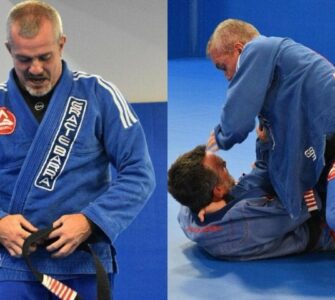Rana, 31, and her sister Lama Qubbaj, 28 love jiu-jitsu. This choice was especially frowned upon in Jordan where this sport is considered both obscure and masculine.
Rana talked about it to Washington Post:
“And then I started to do jiujitsu, my parents didn’t even know what jiu-jitsu is. And then I started to compete, it starts to go on tv and the first thing my father’s friends would go and tell him “So your daughter wrestles? That’s like disgusting.” So he would come to me and say stuff like you embarrassed me today at work… Why can’t you do another sport that’s more acceptable”
She responded to her father:
“Well I love jiu-jitsu”
But when she became victorious everything changed
“And then he got very excited about it, and he came home, and he was so excited, saying, ‘That’s awesome.’ And then he went to work, and people were like, ‘Your daughter got a gold medal in wrestling?’ And then he completely switched. And then we were going on and off between supporting and not supporting because he had too much pressure on him. Now the supporting is way more than the not-supporting. But it can’t switch off. The last time I went and I didn’t get a medal, and he was like, ‘How about you retire?’ ”
The two sisters spoke about the tough spot they were intiially in. On one side, they’ve transformed and feel very much alive. They travel internationally. But they view their culture with sharp observations
“In a lot of cases people get married not because they want to get married but because they’re scared of not getting married.”
Her sister, Lana added:
“Doing jiujitsu is like living . . . For me, it’s the perfect combination of the mind and body synchronization. It’s a joy to practice and a joy to live your life like that.”
“We’re in a kind of culture that really works to hold on to traditions and norms. Even if we think that it is very modern, it’s very hard to be liberated. Maybe we think this thing, but that is contrary in the way we live. Even if someone wants to be supportive, they say, ‘I could never live like you.’ I don’t know if that’s a compliment or an insult.”
Lana actually quit her job as an architect to do jiu-jitsu full time. It seemed deranged “to everybody”:
“My parents went crazy. What’s weird [in the culture], sports is not weird, but getting professional in sports is weird. Everybody is like, ‘Really, you’re what? Really?’ I think my family is in denial. They’re like, ‘She’s just changing jobs!’ ”
Rana’s coworkers also consider her eccentric:
“They think I’m a psycho, basically,”
Rana understands her parents position. Still they teach jiu-jitsu to 12 orphaned or underprivileged girls who revel in the sport and adorably watch and critique Rana’s fights on youtube.
Sometimes, Rana wonders whether she does the girls a disservice, involving them in something so unusual.
Then that thought passes.
A photo posted by Ruba Sayegh (@rubasayegh) on

















